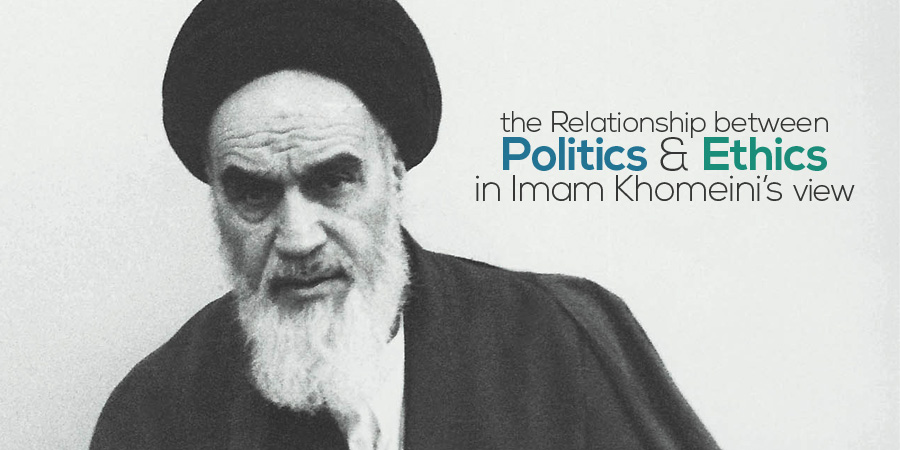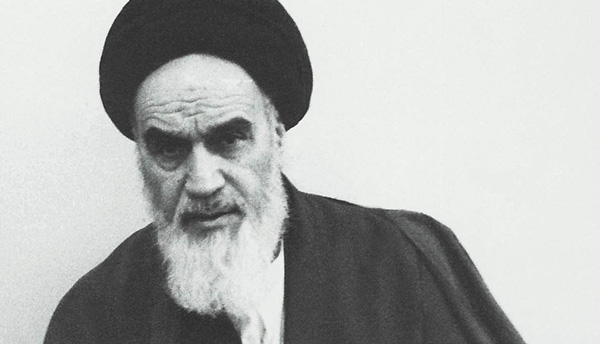What is the Relationship of Politics and Ethics in Imam Khomeini’s view? (1)

In an article entitled, Politics and the Problem of Dirty Hands, Coady endeavors to prove the bitter reality that politics is incompatible with remaining innocent and pure, and anyone who enters the political arena should accept the veneer of infamy, meanness, defilement, and any kind of pollution. It is because political expediency and the human condition are such, and “If they mean dirty hands, then they are the mere offshoot of the human condition”[1] and one cannot escape from them.
The Imām’s approach to this issue is of a different kind: His stand is that politics can, and should, be ethical, for politics is nothing but implementation of ethics in a broader spectrum of the society as well as realization of religious ideals and goals. As such, he believes in the oneness of ethics and politics and in a bid to prove it, he puts forth certain points which are discussed in the content of the following:
- Universality of Islam;
- Meaning of politics and the status of power;
- Politics as indispensable for the realization of Islam; and
- Oneness of ethics and politics in Islam.
Universality of Islam
It was mentioned earlier that man has numerous existential realms and he should nurture and let all of them grow. Now, keeping in view this fact, all divine religions, especially Islam, have appeared so as to nourish these dimensions. The One who holds the reins of authority over the universe, with the knowledge of all the needs of humanity, has sent a prophet (‘a) to every community in every epoch in order to let man attain his perfection: “Because the human being is a multidimensional creature, with many needs, the prophets came to answer these needs and teach man how to act in order to attain true happiness.”[2]
As such, all religions in their respective times have been universal and all the prophets (‘a) have explained all the things needed by the people. “The prophets (‘a) have spoken of those things which concern the spirit, things which concern the different stages of understanding and which relate to the realms of the unseen.”[3] Thus, every religion has had its own particular time of universality until we reach Islam, which is the culmination and perfection of Abrahamic faiths. In this religion, all the needs of humanity have been anticipated and the ways of meeting them precisely specified.
The traditions and the Holy Qur’an have spoken both of issues which concern individual duties and which play a part in man’s development and maturation, and of political issues as well as economic issues; issues which concern society and have something to do with the regulation and moral teachings of the society.[4]
It is with this perception that we see, “We have such a book in which personal affairs, social affairs, political affairs, state administration, and all things are encompassed.”[5] The least doubt on the universality of Islam, and limiting its scope is tantamount to the negation of its principles.
Those who confine Islam to [merely] eating, sleeping, praying, and fasting while not interfering with the problems of this nation, and of the predicaments of this society are not Muslims, [6] according to the narration of the Most Noble Messenger (s).[7]
In the opinion of the Imām, Islam is not a religion which is only concerned with the spiritual and personal needs; rather, “Islam is everything for the human being; that is, it has ideas and views on everything from nature to beyond nature to the celestial world; Islam has a thesis; Islam has a program.”[8] This program of Islam takes into account all the facets and dimensions of life: “Islam has rules and decrees for the entire life of man from the day he is born up to the moment he is delivered to his grave.”[9]
Written by Sayyid Hasan Islami
Translated by Mansoor L. Limba
References:
[1] C.A.J. Coady, “Politics and the Problem of Dirty Hands,” in A Companion to Ethics, ed. Peter Singer (Basil: Blackwell, 1991), p. 382.
[2] Sahīfeh-ye Imām, vol. 4, p. 190.
[3] Ibid., vol. 3, p. 237.
[4] Loc. cit.
[5] Ibid., vol. 18, p. 423.
[6] Sahīfeh-ye Imām, vol. 14, pp. 527-528.
[7] It refers to the statement of the Messenger of God (s), “One who spends the night without having concern on the affairs of Muslims is not a Muslim.”
[.ﻤﻦﺍﺼﺑﺢ ﻮ ﻠﻢﻴﻬﺗﻢ ﺑﺎﻤﻮﺮﺍﻠﻤﺴﻠﻤﻴﻦﻔﻠﻴﺲ ﺒﻤﺴﻠﻢ].
[8] Ibid., vol. 4, p. 9.
[9] Ibid., vol. 1, p. 271.



